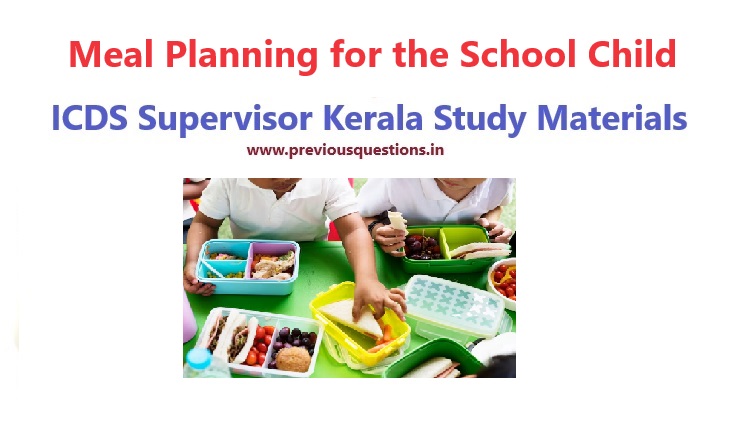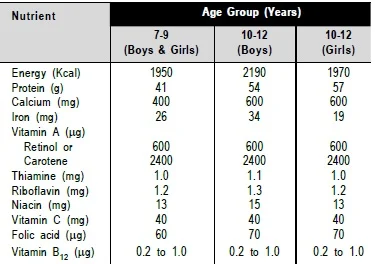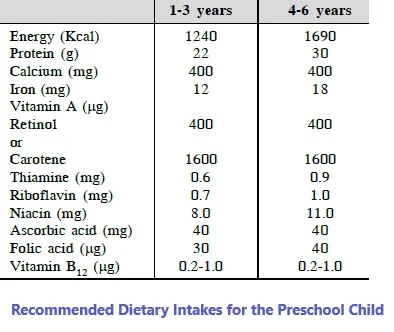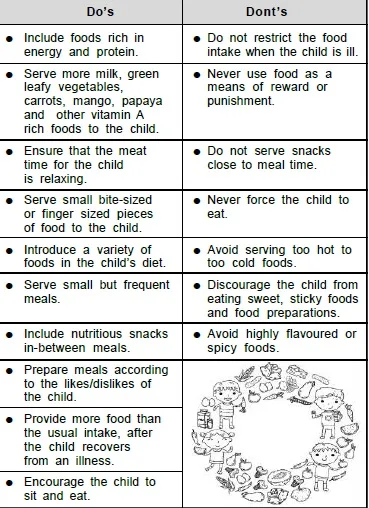Meal Planning for the School Child|ICDS Supervisor Kerala Study Materials
Meal Planning for the School Child
THE SCHOOL CHILD
The term “School Child’ refers to children from the age of 7 years to 12 years.
During the school years the rate of growth further slows down.
This, however, does not mean that no significant growth occurs. In fact, growth continues at a
steady pace.
Further, the school years are characterized by an improvement of the functioning of most tissues and organ systems.
It is important to emphasize that considerable growth and development of both muscles and bones takes place.
The school years precede adolescence and are, in fact, spent in preparation for it. Adolescent is a period of very rapid growth.
It is important, therefore, that a good foundation is laid during the school years. One way in
which we can do this is to provide good food.
A satisfactory diet is, crucial in fostering the optimum growth and development of the child.
RECOMMENDED DIETARY INTAKES FOR THE SCHOOL CHILD
The table summarizes the recommended dietary intakes for school children.
There is an increase in the RDIs for energy, protein, calcium, thiamine (B1), riboflavin (B2), and niacin as age increases.
The RDIs for vitamin C, folic acid, vitamin B12 and vitamin A remain unchanged from the age of 7 to the age of 12.
The influence of gender becomes evident after the age of 10 years. This is the reason why RDIs are specified separately for boys and girls in the 10-12 years category.
MEAL PLANNING FOR THE SCHOOL CHILD
Which Nutrients are of Particular Importance?
Nutrients of particular importance in the school years are:
Energy-giving nutrients (carbohydrates and fats)
Protein
Iron and
Calcium
Which Foods to Select?
When we plan diets we have to decide on which foods to select and how much to give of these foods.
The points to keep in mind are:
Include items from each of the three food groups (energy-giving, body-building and protective/ regulatory) in each meal.
Include an animal protein source in each meal if possible and if income permits; use cereal-pulse combinations to improve protein quality.
Include foods rich in calcium and iron; you are already familiar with the food sources of these nutrients.
What are the other Specific Considerations?
The school child, unlike the preschooler, spends a great deal of time away from home. He is exposed to various influences as a result of which he picks up new food habits.
He tends to miss breakfast and munches snacks in between meals.
He seldom bothers about packed lunches.
The following section gives you ideas on how to overcome these difficulties and ensure satisfactory diets.
Let us start with points about the main meals.
(1) Main Meals
Breakfast should be substantial and should be planned around a cereal-based preparation.
Milk/ egg/pulse and a fruit should be included. Choice of items would be dependent on the money available.
Dinners and lunches must be balanced meals based on items rich in protein, vitamins and minerals.
They are the most substantial meals in the day.
With the kind of meal pattern we adopt, we would give a packed lunch for the child to eat at school.
In addition, a “late lunch” could be given at home when the child returns from school. In such a case the late lunch would be lighter.
Generally dinner can be a more elaborate meal because the child can eat at leisure, but this does not mean it should be a heavy meal.
Here, of course, the terms, “heavy” and “light” refer to contribution to total energy
provided by the day’s diet.
One must remember that the heavier meals such as lunch and dinner should also contribute more protein, vitamins and minerals as compared to meals such as tea-time or even
breakfast.
In addition to these we must also be aware of the possibility of the child receiving a mid-day meal or snack as part of a nutrition programme in schools.
Some schools offer a complete meal whereas others offer a ready-to-eat snack.
There is considerable variation from one State to another.
According to the recommendations, mid-day meals should provide at least one-third of the daily energy RDI and about half of the daily protein need.
Packed lunches should be easy to carry and handle, require minimum preparation time and should be balanced.
The lunch must include sources of protein, vitamins and minerals in addition to energy.
Dry preparations such as a drypulse or cottage cheese (pan eer) and veg etable o r m eat-veg etable preparations can be offered.
Items like sandwiches and pizzas are common in the high income group.
Lower and middle income groups usually serve items like paranthas/rotis/rice and dal or vegetable; idlis and sambar; curd rice/tamarind rice and similar preparations.
If they are not balanced, any of the following suggestions might help depending on which food
group is missing or inadequate.
The body-building group:
(a) Add a pulse in suitable form
(b) Add cottage cheese (paneer) or milk-based dessert
(c) Add meat in suitable form
(d) Include egg in suitable form
The protective-regulatory group:
(a) Add a fruit or fruit-based preparation
(b) Add a vegetable preparation
(2) Snacks
Snacks selected should be balanced rather than just calorie-rich and should supply substantial amounts of nutrients particularly energy, protein, calcium and iron.
Snacks can be offered mid-morning and at tea-time.
The packed lunch can also take the form of a snack. School children, in fact, are very fond of
eating snacks in between meals and during meal imes.
(3) Serving Size and Meal Frequency
Serving size (the amount served at a time) should be planned keeping the child’s capacity to eat in mind;
this is where increasing meal frequency helps.
(4) Food Preferences
Variety must be included by selecting different type of foods and introducing variety in colour, flavour, texture, form and shape.
The child enjoys foods prepared using different cooking methods and food combination.
Sufficient attention must be given to the child’s likes and dislikes.
Items disliked should be included in a form readily accepted by the child e.g., if a
child does not like a particular vegetable it could be boiled and mashed and mixed with other foods to make cutlets which the child might like.
Similarly, if a child does not like milk it could be offered as curd, custard or paneer (cottage cheese) preparations.
Read Also:
ICDS Supervisor Questions and Answers
Common Health Problems in India & Different Levels of Health care in India
1. Meal Planning for the Infant
2. Spplementary foods for Infants
4. How to Feed Infant? Meal Plan for Infants
5. Meal Planning for the Prechoolers
Topic wise Notes for ICDS Supervisor Exam
3. Psychology
4. Physiology
5. Microbiology
6. Sociology
MCQ Questions & Answers for ICDS Supervisor
2. Previous Questions MCQ|ICDS Supervisor Exam|ICDS Supervisor Kerala PSC (1-20)
3. Previous Questions MCQ|ICDS Supervisor Exam|ICDS Supervisor Kerala PSC (21-30)
13. ICDS Supervisor Previous Questions Set 1
14. ICDS Supervisor Previous Questions Set 2
15. ICDS Supervisor Previous Questions Set 3
16. ICDS Supervisor Previous Questions Set 4
17. ICDS Supervisor Previous Questions Set 5
18. ICDS Supervisor Previous Questions Set 6
19. ICDS Supervisor Previous Questions Set 7
20. ICDS Supervisor Previous Questions Set 8
21. ICDS Supervisor Previous Questions Set 1
22. Elementary Care & Education MCQ
23. Solved Previous Question Paper ICDS Supervisor
24. Women & Child ICDS Supervisor Exam
25. Extension Education Notes for ICDS Supervisor
26. Complete NOTES Child Psychology
Nutrition Notes
More Topic wise Notes can be got from the Website https://www.previousquestions.in
To Join Telegram, Click Here
Check These also
Job News
Exam Preparation
Exam Preparation
Download printable OMR Sheet PDF for practice
ബിഹേവിയറിസം
ഗസ്റ്റാള്ട്ടിസം Gestaltism Learning methods
ജ്ഞാതൃവ്യവഹാരവാദം ( Cognitive behaviorism)
ജ്ഞാതൃവാദം (Cognitivism)
നാഡീമന:ശാസ്ത്രം (neuropsychology)|പഠനത്തെ സ്വാധീനിക്കുന്ന ഘടകങ്ങള്
വ്യക്തിത്വം Personality
PART 2 ഉള്പ്പെടുത്തിയുളള വിദ്യാഭ്യാസം Inclusive education
ദിനാചരണങ്ങള് Important dates based on themes















![[Set 3] MCQ for ICDS Supervisor Exam|ICDS Supervisor Kerala PSC](https://blogger.googleusercontent.com/img/b/R29vZ2xl/AVvXsEirmpde6UGlx94eDLtWkrJ18PAc_d8GVw_K-4E1izTltkjugPJEyBVplbm_S85f0gxNowfcbT6afCPnAjTF0_TKYK9Lq7zm1fnQU-TPsKEosx0opg5d05b-nry5qBPrKUZMoVD7BOFpW-5jxoAlMCTysmHKi30ieam3tPtA_ohH_Z5D2Uu1PPxt-qZ38wY/s72-c/icds-supervisor-mcq.jpg)

![[Solved paper]Assistant Engineer Agriculture Kerala PSC Previous Question Paper|Assistant Engineer Agriculture Kerala PSC Question paper 665/2022](https://blogger.googleusercontent.com/img/b/R29vZ2xl/AVvXsEiE5XMCyjBp5qgQ6gc1f5YxnObTDPt4ioa1TM0DhzIzBsKfJUJZg1nhfOcliABQCpnIj9INlw2xliBzlEEPCd_tgUhxvJhySogAkZFGKaWZ9GujHt4KwM-DSmOLBbLLlexxurubFQobMSgo11YP_2eVKCTrV0CWiwOlouEr1abUj5m6V5fJomuMxLK5U5o/s72-w640-c-h360/Assistant%20Engineer%20Agriculture%20Kerala%20PSC%20Previous%20Question%20Paper.jpg)
